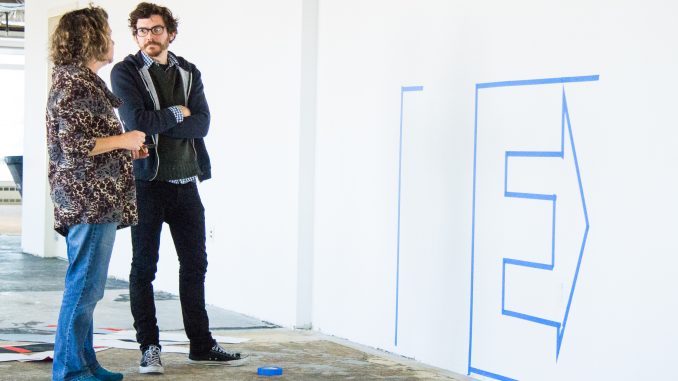
The large building on North American Street stands alone in the Fishtown neighborhood skyline.
Paintings on canvas are housed in a room on the third floor of the large building, swaddled delicately in bubble wrap and placed with care onto specific shelves. Stark cement ceilings and brick walls house the carefully stored works of art. The ambiance would be harsh if not for the golden-yellow light trickling in from the windows.
This quiet archive of art is home to InLiquid, a nonprofit organization founded by Rachel Zimmerman in 1999 on the realization that Philadelphia was simply not showcasing its artists in the best way possible.
Today, InLiquid strives to provide exposure for the city’s best artists through online media and exhibitions throughout the city.
“Collaboration is a big thing for us,” site editor Erica Minutella said. “Even outside of the office. We could not exist without it.”
Working collaboratively makes sense for InLiquid, since Philadelphia’s art scene is “familial,” Minutella said. The nonprofit is all about making partnerships and sticking with them. Many of InLiquid’s partnerships have existed since the nonprofit started 15 years ago.
After growing up in Philadelphia and attending school in New York City, Zimmerman said she was excited to return to her hometown and attend the University of Pennsylvania to “see what needs to be done and try to fix it,” she said.
The biggest issue Zimmerman said she saw was accessibility of art. For Zimmerman, that meant inviting buyers and individuals who simply wanted to appreciate their work.
“Philadelphia has always been a city with a lot of work, but nobody was showing it,” Zimmerman said.
Zimmerman said she hoped to help nurture an arts community in Philadelphia and make sure everyone knew work was being made right here, right now.
“It’s about getting the layman, so to speak, to see what’s being made and what’s being done,” Zimmerman said. “You’d ask incredibly talented artists to participate in a gallery here, and they wouldn’t want to because they already had a gallery in New York. That’s slowly changing, though.”
Both Zimmerman and Minutella agreed that selling an artist’s work is a gratifying moment, but making sure artists have opportunities and places to the show their work is even more rewarding.
The artist will certainly benefit, Zimmerman said, but the community as a whole will improve as well.
“There needs to be different spaces than just commercial galleries,” Zimmerman said. “Otherwise, a lot of artists’ work may never be seen. That’s why we want to help change the dynamic of the Philly mindset.”
Being a nonprofit affords InLiquid the ability to change that mindset, Zimmerman said. Making that change, She said, is rooted in removing the inaccessibility and intimidation associated with art.
Minutella experienced those feelings, despite growing up around art and, “gradually falling in love with it.”
“I had that same intimidation behind buying art,” Minutella said. “But then I got to be behind the scenes and talk directly with the artists. Then I saw all the work and creativity that goes behind each piece.”
Sara McCorriston, now the co-founder and co-owner of Paradigm Gallery, said working with InLiquid improved her career after she graduated college in 2009 from the University of the Arts with a bachelor’s degree in Theatrical Design in Technology.
In 2010, McCorriston knew she wanted to stay in Philadelphia and set down roots in the city. She began looking for ways to be involved in new opportunities when she found InLiquid, which McCorriston now calls “one of the hubs of the Philly art world.”
“All the different projects and exhibits they offered really helped me figure out who I was as an artist,” McCorriston said.
Having the chance to curate exhibits with InLiquid gave McCorriston the experience of working on both sides – the artist and the gallery. When she opened Paradigm Gallery with Jason Chen in February 2010, she knew exactly what she did and did not want the gallery to be.
McCorriston said that organizations like InLiquid – ones with a “solid mission statement” – could help an artist grow and accelerate.
With a laugh, Minutella said, “Don’t panic! No matter how obscure your skill is, you’ll end up where you’re supposed to be.”
“Do your research and find out what places are doing,” Zimmerman said. “Be engaged, volunteer, intern. People need to know what you’re doing.”
When the public is aware of an artist’s work, the best of things can happen, Zimmerman said, like “making the perfect fit between artist and project.” Zimmerman said that feeling is one of her favorites.
“If you can help one person, you’re doing something right,” Zimmerman said.
Victoria Mier can be reached at victoria.mier@temple.edu


Be the first to comment